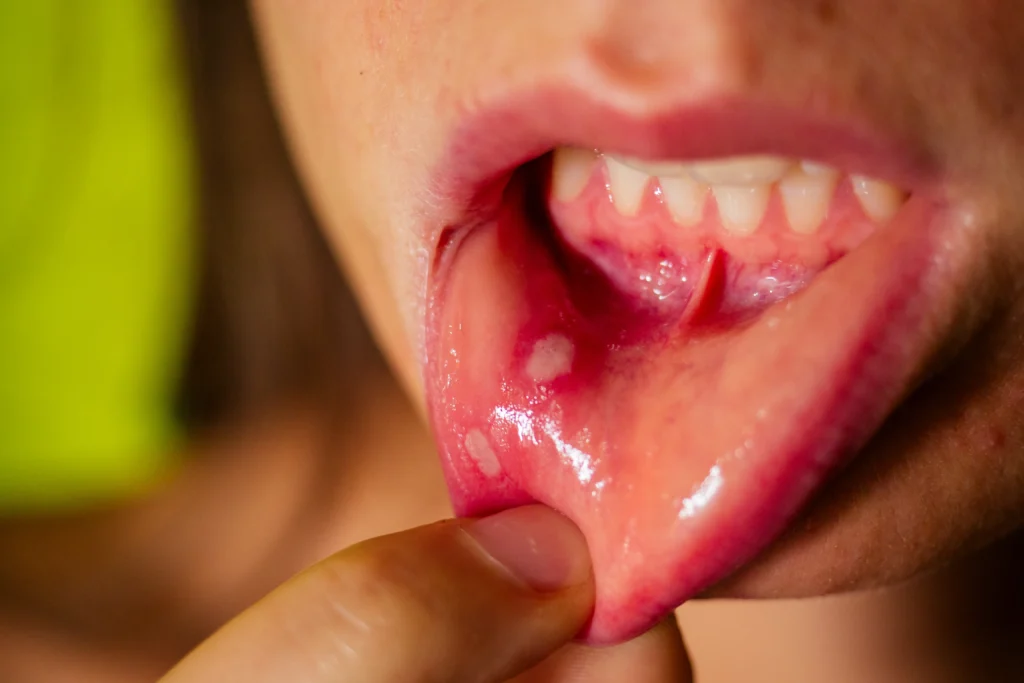Mouth ulcers are tiny, painful lesions that appear inside the mouth, usually on the tongue, gums, lips, or inner cheek lining. Although they are usually harmless and heal on their own, these ulcers can cause discomfort while eating, drinking, or speaking.
Typically, mouth ulcers are round or oval with a white, yellow, or gray center and a red border. While occasional ulcers are common, recurrent or severe cases may signal underlying health issues or nutritional deficiencies.
The good news is that most mouth ulcers are treatable and preventable with simple oral care, dietary changes, and stress management techniques.
Understanding the different types of mouth ulcers helps in determining the appropriate treatment. The most common type is the aphthous ulcer, also known as a canker sore. These ulcers are not contagious and may be triggered by stress, hormonal changes, or immune responses.
Another type is traumatic ulcers, which result from accidental bites, irritation from braces, or rough brushing. Infections, certain medications, or underlying conditions like celiac disease can also cause more persistent or severe ulceration.
Other potential causes include:
Though often temporary, it’s still important to monitor recurring ulcers and address the root cause for lasting relief.

Identifying mouth ulcers at an early stage makes it easier to manage pain and prevent complications. Here are common signs to watch for:
Generally, mild ulcers heal within 7–10 days without leaving scars. However, large or deep ulcers may take longer and require treatment. Some may even bleed if irritated.
If ulcers last more than two weeks, it’s recommended to seek professional evaluation, as this may point to more serious health issues.
Treatment for mouth ulcers depends on their severity and frequency. Thankfully, most ulcers heal naturally. Still, several remedies and treatments can ease discomfort and speed up healing.
Home Care Solutions:
Medical Options:
While occasional ulcers can be managed at home, persistent or painful sores may require a dentist’s care. Especially if ulcers are accompanied by fever, diarrhea, or skin rash, further medical testing may be necessary.
Preventing mouth ulcers is possible by adopting small but consistent lifestyle changes. Here are practical tips to help you avoid future flare-ups:
Moreover, maintaining good oral hygiene habits plays a key role in reducing the chances of ulcer formation. If you wear braces or dentures, ensure they are properly fitted to avoid injury to the mouth lining.
By being mindful of your habits, you can significantly reduce the risk of recurring mouth ulcers and enjoy a healthier oral environment.
Although most mouth ulcers resolve without intervention, certain signs indicate the need for professional care. You should consult a dentist or healthcare provider if:
In such cases, a detailed oral examination and possibly blood tests may be required to rule out infections, autoimmune diseases, or nutritional issues.
Early diagnosis and proper treatment not only improve healing time but also prevent possible complications, such as spreading infection or scar tissue formation.
Mouth ulcers are a common oral issue that most people will experience at some point in their lives. While usually harmless, they can interfere with daily comfort if not managed properly.
Thankfully, with proper oral hygiene, a healthy diet, and stress control, you can significantly reduce the frequency and severity of mouth ulcers. Understanding the causes, recognizing the symptoms early, and following recommended care routines are key to effective relief and prevention.
Keep in mind, your oral health reflects your overall wellness caring for it eases discomfort and boosts both health and self-confidence. Don’t ignore recurring ulcers; take action early to ensure a pain-free, healthy smile.
No, common mouth ulcers such as canker sores typically aren’t infectious.
Minor ulcers usually heal within 7 to 10 days, while more severe ones may take up to 2–3 weeks.
Yes, acidic, spicy, and salty foods may trigger or worsen ulcers in sensitive individuals.
Possibly. Deficiencies in B12, folate, and iron are common contributors to frequent ulcers.
If they persist for more than two weeks, recur frequently, or are extremely painful, professional care is advised.
Hyderabad : +91 6305 971445
Anantapur: +91 70758 90089
Goa: +91 83266 32500
Mon to Sat 10:00AM to 8:00PM
Sun 10:00AM to 12:00PM

Our goal is to provide friendly, caring dentistry with the highest standards in general, cosmetic, and specialist treatments. We strive to be the best dental hospital for comprehensive oral care.
We use advanced dental technology to deliver safe, precise, and painless treatments for every patient.